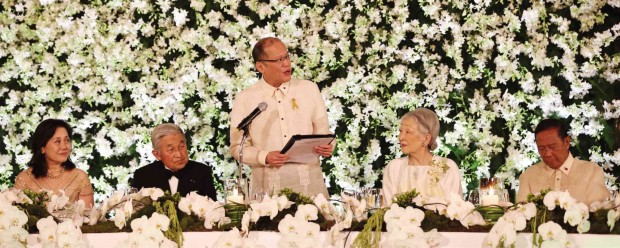No selfies, no gifts during dinner for Japan’s imperial couple

BANQUET FIT FOR EMPEROR President Aquino addresses Emperor Akihito and Empress Michiko at a state dinner on Thursday in Malacañang’s Ceremonial Hall. With them are the President’s sister Pinky Aquino-Abellada and opposition presidential candidate Vice President Jejomar Binay. LYN RILLON
The Japanese imperial couple would surely have been the subject of selfies among the country’s rich and powerful at the reception dinner hosted by the Japanese envoy to the Philippines.
But as most of the guests would later know, that would be against the Japanese protocol.
Instructions were laid out moments before Emperor Akihito and his wife Michiko arrived at the residence of Japanese Ambassador to the Philippines Kazuhide Ishikawa at the posh Forbes Park in Makati City on Thursday evening.
The couple are on a historic five-day state visit to the Philippines which began on Tuesday.
Speaking over a microphone, Atsushi Ueno, the deputy chief of mission of the Japanese Embassy in Manila, began his instructions with “their excellencies” to the guests within the hall of Ishikawa’s house.
He was addressing the country’s throng of VIPs that included former President Fidel V. Ramos and his wife Ming, Senate President Franklin Drilon, House Speaker Feliciano Belmonte Jr., Foreign Secretary Albert del Rosario and other members of the Aquino cabinet, and leading businessmen led by Jaime Zobel de Ayala and Ramon Ang.
“Only the press and the official photographers are allowed to take pictures here. So please refrain from taking photos with any device including a mobile phone,” the Japanese diplomat said.
Japanese and Filipino journalists covering the reception were kept at bay by a cordon at one corner of the hall.
“Please turn off your mobile phone and set it to silent mode,” the diplomat went on.
“Unless their majesties extend their hands, please refrain from shaking hands with them,” the Japanese official said, repeating it later to stress the point.
“I’m sorry to say (this),” the embassy’s deputy said afterward, sounding apologetic for the rigid rules that they were bound to follow.
“Please do not present any gift to the majesties,” he said, drawing little pockets of laughter in the audience.
“Talk to the majesties only when they talk to you. Talk clearly and loudly,” he went on.
The last rule, he said, “their majesties wish to have conversations with as many guests as possible. Please refrain from talking too long. Please stop trying to have a conversation again and again with their majesties.”
The emperor in a black suit and his empress in a brown kimono, the Japanese traditional garment, arrived with President Aquino and sister Pinky Aquino-Abellada at 7:11 p.m.
The guests one by one came to the emperor and the empress, as if according to their stature. Former president Ramos came first and then followed by Drilon and Belmonte.
A bow, followed by a handshake was, however, the way to greet the emperor and the empress as the journalists have seen.
Those seeking audience with their majesties have to line up and wait for their turn in an orderly fashion which was not a typical sight during reception for diplomats, businessmen and government officials.
Aquino and his sister left half an hour afterward with the royal couple seeing them off.
Without eating, the Japanese imperial couple left the reception shortly before 8 p.m. and headed to Hotel Sofitel Philippine Plaza, where they are billeted in the duration of their visit.
The Thursday night’s list of protocols showed how the Japanese revere the Japanese Emperor, who lack the executive and political power but has remained a figurehead in Japan.
The emperor which is called as “heavenly sovereign” in the Japanese language, has remained Japan’s “symbol of the State and the unity of the people” as its 1947 Constitution states.














